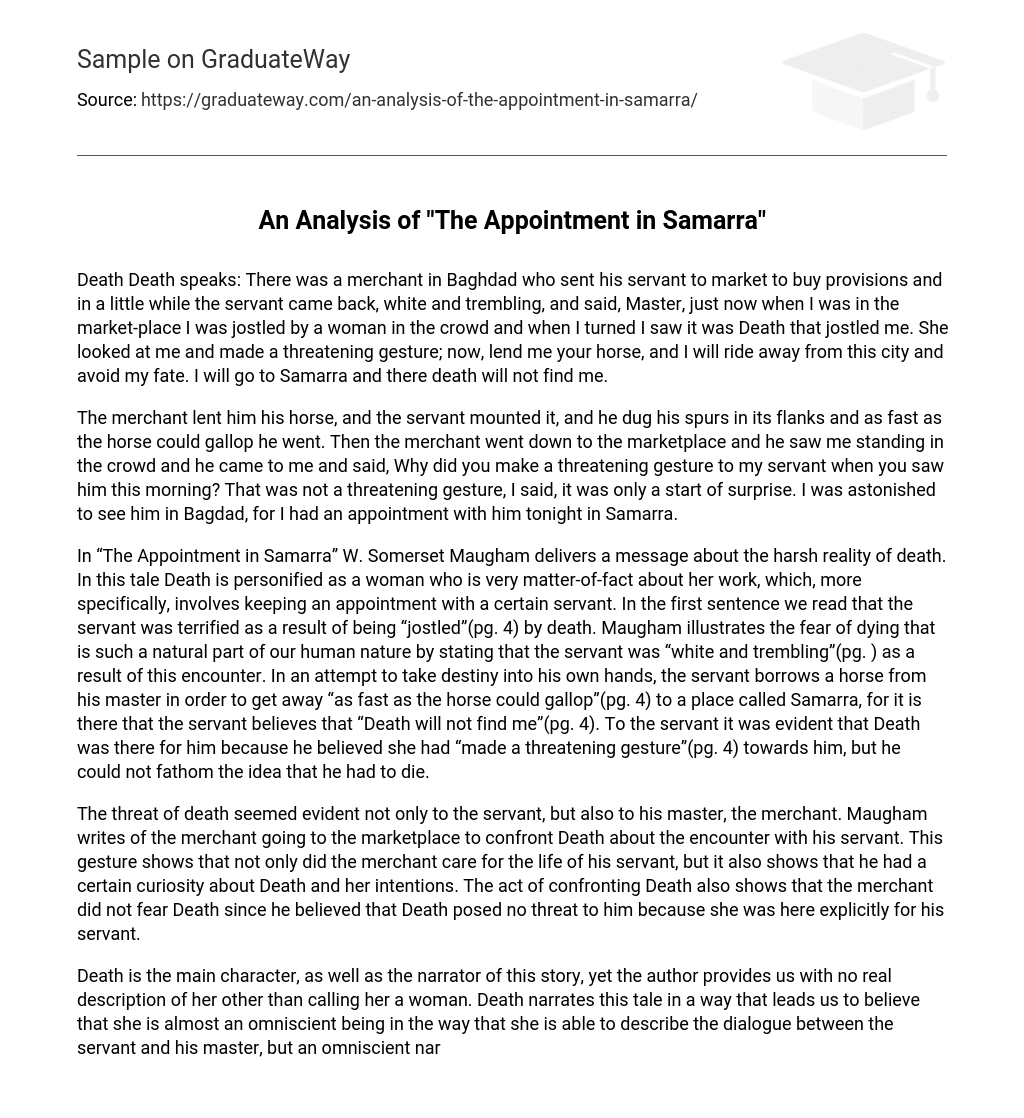Death Death speaks: There was a merchant in Baghdad who sent his servant to market to buy provisions and in a little while the servant came back, white and trembling, and said, Master, just now when I was in the market-place I was jostled by a woman in the crowd and when I turned I saw it was Death that jostled me. She looked at me and made a threatening gesture; now, lend me your horse, and I will ride away from this city and avoid my fate. I will go to Samarra and there death will not find me.
The merchant lent him his horse, and the servant mounted it, and he dug his spurs in its flanks and as fast as the horse could gallop he went. Then the merchant went down to the marketplace and he saw me standing in the crowd and he came to me and said, Why did you make a threatening gesture to my servant when you saw him this morning? That was not a threatening gesture, I said, it was only a start of surprise. I was astonished to see him in Bagdad, for I had an appointment with him tonight in Samarra.
In “The Appointment in Samarra” W. Somerset Maugham delivers a message about the harsh reality of death. In this tale Death is personified as a woman who is very matter-of-fact about her work, which, more specifically, involves keeping an appointment with a certain servant. In the first sentence we read that the servant was terrified as a result of being “jostled”(pg. 4) by death. Maugham illustrates the fear of dying that is such a natural part of our human nature by stating that the servant was “white and trembling”(pg. ) as a result of this encounter. In an attempt to take destiny into his own hands, the servant borrows a horse from his master in order to get away “as fast as the horse could gallop”(pg. 4) to a place called Samarra, for it is there that the servant believes that “Death will not find me”(pg. 4). To the servant it was evident that Death was there for him because he believed she had “made a threatening gesture”(pg. 4) towards him, but he could not fathom the idea that he had to die.
The threat of death seemed evident not only to the servant, but also to his master, the merchant. Maugham writes of the merchant going to the marketplace to confront Death about the encounter with his servant. This gesture shows that not only did the merchant care for the life of his servant, but it also shows that he had a certain curiosity about Death and her intentions. The act of confronting Death also shows that the merchant did not fear Death since he believed that Death posed no threat to him because she was here explicitly for his servant.
Death is the main character, as well as the narrator of this story, yet the author provides us with no real description of her other than calling her a woman. Death narrates this tale in a way that leads us to believe that she is almost an omniscient being in the way that she is able to describe the dialogue between the servant and his master, but an omniscient narrator is incapable of being surprised himself or herself and we find this not to be the case in this story.
I believe the author intended to do this in order to make Death appear mysterious, yet also familiar to the reader. Once Death is given human elements, like the ability to be surprised, it gives the illusion that one can cheat death. I find it rather peculiar that in this tale we are led to believe that Death was very easily recognizable. The servant knew immediately that the woman that “jostled”(pg. 4) him was Death. We also read that the merchant went to the marketplace and could see Death standing in the crowd(pg. 4).
Does this mean that anyone in the crowd recognized who Death was, but simply were not afraid of her unless she made what was perceived as a “threatening gesture”(pg. 4) towards them? I believe that the author was trying to illustrate the inescapability of Death by showing us that Death walks among us, so to speak. It is easy to accept death when it does not affect you directly. We know that death is very real, and also inevitable, but unless we are threatened by death, like the servant, we can graciously accept death’s presence.
The final point that Maugham makes is one of predestination. When the merchant confronts Death about the apparent “threatening gesture”(pg. 4) that she made towards his servant, she denies it. She claims that it was merely a “start of surprise”(pg. 4) because she was not expecting to see him there because she had an appointment with him later that evening in Samarra(pg. 4). Earlier we read that the servant, believing that Death was at the marketplace for him, fled to Samarra in order to escape Death, but ends up running into the very thing that he was trying to escape.
Had the servant stayed in Baghdad he would have avoided the meeting with Death, but the events transpired in a way that ultimately led to his death. Maugham seems to challenge the reader in the final sentence with a very serious question: are we all predestined to die at a particular time or will we be able to stop death when she comes for us? Works Cited W. Somerset Maugham. The Appointment in Samarra. Literature: An Introduction to Fiction, Poetry, Drama and Writing. Compact 5nd ed. Ed. K. L. Kennedy and Dana Gioia. New York: Pearson Longman, 2007. 4. Print.





